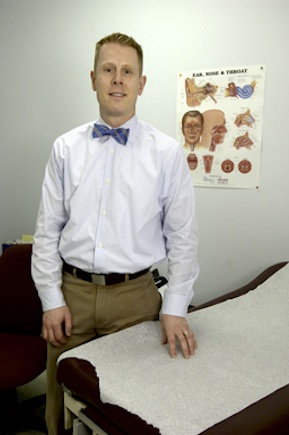Everything You Need to Know to Keep a Bug at Bay
Avoiding and treating the norovirus

Earlier this month, while Boston University students were home for intersession, an uninvited visitor made its way into a couple of well-regarded Boston institutions: Massachusetts General Hospital and Brigham and Women’s Hospital. The visitor, a potent gastrointestinal virus known as norovirus, made life miserable for more than 70 patients and two dozen physicians. Now Boston University officials are doing everything they can to make sure that norovirus doesn’t happen here. David McBride, medical director of BU’s Student Health Services, says the best way to keep the virus from spreading is to wash hands carefully and often, preferably with an alcohol-based sanitizer. BU Today spoke with McBride about the virus and what students and faculty and staff can to do stay healthy.
BU Today: What causes the norovirus? How do people become infected?
McBride: People shed it in their stool, and when people don’t wash their hands adequately they can transfer it to someone else. It can also get onto surfaces or into food.
What are the symptoms?
Vomiting and diarrhea. There can also be flu-like symptoms, such as headache, fever, body aches, things like that.
How long does it take for symptoms to appear after you have contracted the virus?
The incubation period is between 24 and 48 hours.
How serious is the virus? Are there any long-term effects?
Norovirus does make people fairly sick. It can cause dehydration to some degree, although usually it’s the kind of thing that passes within 24 to 48 hours. There are no long-term effects.
What can be done to prevent it?
Hand washing is the only thing that can prevent it — careful hygiene is very, very important.
What treatment, if any, is available?
We don’t recommend seeking care when you’ve contracted the virus unless you’re sick to the point where you can’t keep fluids down. The reason for that is mostly that if you go out when you have it, you can spread it, so you’re better off “holing up” with a large amount of fluids and trying to rest until it passes.
For more information, click here.
Amy Laskowski can be reached at amlaskow@bu.edu.

Comments & Discussion
Boston University moderates comments to facilitate an informed, substantive, civil conversation. Abusive, profane, self-promotional, misleading, incoherent or off-topic comments will be rejected. Moderators are staffed during regular business hours (EST) and can only accept comments written in English. Statistics or facts must include a citation or a link to the citation.